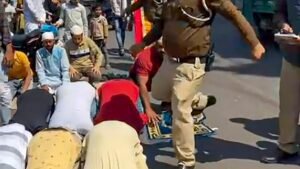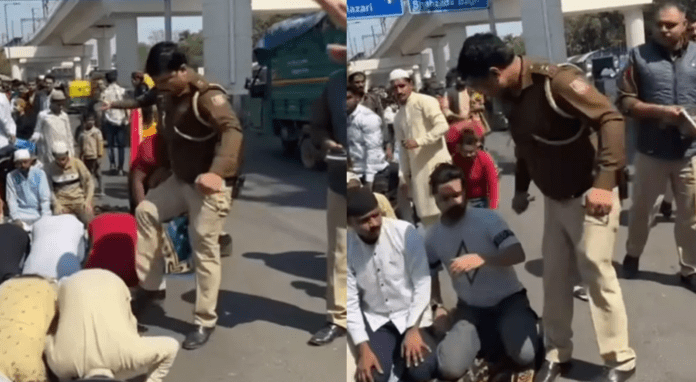Unveiling the Train of Hatred Examining the Incident of Religious Intolerance in Delhi.
2 min read 2024-03-09, 12:55 AM IST
SummaryVideo captures police officer kicking Muslims during prayer in Delhi. Symbolizes broader issues: Reflects societal tensions, communalism, and political manipulation. Rooted in poison of communalism, exacerbated by political polarization. Undermines trust, tarnishes reputation, perpetuates bigotry. Legal reforms for minority protections and justice. Education and awareness to promote tolerance. Police training and accountability. Political accountability to prevent divisive rhetoric. Urges collective action against hatred and bigotry for a more inclusive society. |
In recent years, incidents of religious intolerance and hatred have stained the fabric of society in many parts of the world. One such incident that has garnered significant attention is the video capturing an act of religious discrimination against Muslims during prayer in Delhi, India. This incident not only highlights the immediate issue at hand but also sheds light on deeper societal tensions and political manipulations. In this essay, we will delve into the specifics of the incident, analyze its implications, and discuss potential avenues for reconciliation and progress.
The video in question portrays a disturbing scene where individuals engaged in prayer are subjected to humiliation and violence by a police officer in Delhi. The act of kicking individuals while they were in prostration during Namaz is not only an affront to their religious rights but also a manifestation of the underlying intolerance that plagues society. The incident, however, did not unfold in isolation; it is symptomatic of broader issues of communalism and political polarization that have permeated Indian society.
At the heart of this incident lies the poison of communalism, which has been injected into the social fabric by vested interests for political gains. The polarization of communities for electoral benefits has fueled an environment where such acts of discrimination and violence are not only tolerated but, in some cases, encouraged. The erosion of trust between communities and the misuse of power by authorities exacerbate the situation, leading to a vicious cycle of hatred and resentment.
Moreover, the incident underscores the failure of institutions, particularly law enforcement agencies, to uphold the principles of justice and equality. The suspension of the police officer involved is a necessary step, but it does little to address the systemic issues that allow such abuses of power to occur with impunity. There is a need for comprehensive reforms within the police force and the judiciary to ensure accountability and prevent future occurrences of similar atrocities.
The repercussions of this incident extend beyond the immediate victims and perpetrators. It sends a chilling message to minority communities about their precarious position in society and the fragility of their rights. Furthermore, it tarnishes India’s reputation on the global stage, undermining its claims to secularism and pluralism.
The incident also highlights the role of media and public discourse in shaping perceptions and attitudes towards minority communities. The language used by certain sections of the media, contributes to the normalization of bigotry and prejudice, further deepening divisions within society.

Addressing the root causes of religious intolerance and communalism requires a multi-faceted approach involving government intervention, civil society engagement, and grassroots initiatives.
- Legal Reforms: There is an urgent need for legal reforms to strengthen protections for religious minorities and ensure swift and impartial justice for victims of religious discrimination. Additionally, stringent measures should be put in place to hold perpetrators of hate crimes accountable.
- Education and Awareness: Promoting interfaith dialogue and cultural sensitivity through education and awareness campaigns can help foster mutual respect and understanding among different religious communities. Schools, religious institutions, and community organizations can play a pivotal role in promoting tolerance and pluralism.
- Police Training and Accountability: Police officers should undergo regular training on human rights and diversity to sensitise them to the needs and rights of religious minorities. Furthermore, mechanisms should be established to hold law enforcement officials accountable for any abuses of power.
- Political Accountability: Political leaders must refrain from using religious identity as a tool for electoral gains and instead promote inclusive policies that benefit all segments of society. Civil society organizations and media outlets should hold politicians accountable for any divisive rhetoric or actions that exacerbate communal tensions.
The incident of religious intolerance in Delhi serves as a stark reminder of the challenges posed by communalism and religious polarization. It calls for collective action and solidarity among all members of society to reject hatred and bigotry and strive towards a more inclusive and harmonious future. By addressing the root causes of religious intolerance and upholding the principles of justice and equality, we can build a society where every individual, regardless of their religious beliefs, feels safe, respected, and valued.

